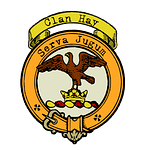Welcome back to "A Clan A Day Podcast." I’m your host, Colin MacDonald, and today we’re exploring the tumultuous history of Clan MacDonald, one of the largest and most powerful clans in Scotland. The MacDonalds, also known as Clan Donald, have a legacy that is deeply entwined with the history of the Highlands and the Isles, marked by both grandeur and tragedy.
The origins of Clan MacDonald are rooted in the figure of Somerled, a warrior king of the 12th century, often called "Rí Innse Gall" or "King of the Isles." Somerled, of Norse-Gaelic descent, rose to power in the Hebrides and western Scotland, leading a successful revolt against the Norse control of the Isles. Through a combination of military might and strategic marriages, he established a dynasty that would dominate the west coast of Scotland for centuries. Upon his death in 1164, Somerled’s vast territories were divided among his sons, with his descendant, Donald, giving his name to Clan MacDonald.
The early MacDonald chiefs wielded significant influence, and by the 14th century, the clan had become the Lords of the Isles. This title granted them authority over much of the Hebrides and parts of the western mainland, making them virtually independent rulers, often more powerful than the Scottish crown itself. The Lords of the Isles maintained their own court, administered justice, and had the power to raise armies, functioning as a sovereign state within a state.
One of the most notable chiefs was John of Islay, the first Lord of the Isles, who solidified the clan’s power through strategic alliances and land acquisitions. His successors continued to assert their dominance, often in opposition to the Scottish kings. The MacDonalds' claim to the earldom of Ross, which they acquired through marriage, was particularly contentious, leading to several confrontations with the crown.
The relationship between the MacDonalds and the Scottish monarchy was fraught with tension, culminating in the Battle of Harlaw in 1411. Here, Donald of Islay, the second Lord of the Isles, led his forces against the royal army in a bid to secure the earldom of Ross. Although the battle was indecisive, it underscored the MacDonalds' power and the crown’s inability to fully control them.
However, the peak of MacDonald power also sowed the seeds of its downfall. The Scottish crown, wary of the threat posed by such a powerful semi-independent lordship, began to systematically undermine the Lords of the Isles. This tension reached a boiling point in 1493 when John MacDonald II, the last Lord of the Isles, was forced to forfeit his titles and lands to King James IV. This marked the end of the Lordship of the Isles as a significant political entity and the beginning of a more fragmented and vulnerable period for the MacDonalds.
Despite the loss of the lordship, Clan MacDonald remained influential, though their power was divided among various branches of the clan, such as the MacDonalds of Sleat, Clanranald, Glengarry, and Keppoch. These branches often found themselves at odds with each other, as well as with the Scottish government, leading to further weakening of the once-united clan.
One of the darkest chapters in the history of Clan MacDonald is the Massacre of Glencoe in 1692. Following the failed Jacobite uprising of 1689, the Scottish government sought to suppress Highland clans who were seen as disloyal to King William III. The MacDonalds of Glencoe, led by Alastair MacIain, were targeted due to a perceived delay in pledging allegiance to the king. Under the guise of hospitality, government troops led by Captain Robert Campbell of Glenlyon were billeted with the MacDonalds for over a week before turning on their hosts in a brutal and treacherous slaughter. This massacre remains a symbol of betrayal and tragedy in Scottish history, deeply ingrained in the collective memory of the MacDonalds.
Despite these setbacks, the MacDonalds continued to play a significant role in Scottish history, particularly during the Jacobite risings of the 18th century. Many MacDonalds fought for the Jacobite cause, most notably at the Battle of Culloden in 1746, where the Jacobites were decisively defeated, marking the end of the clan system as it had been known.
In the centuries that followed, Clan MacDonald, like many Highland clans, faced the challenges of depopulation, emigration, and the erosion of traditional clan structures. Yet, the spirit of Clan Donald endured. The clan’s legacy is celebrated today through the Clan Donald Centre at Armadale on the Isle of Skye, where visitors can learn about the rich history of the MacDonalds and their impact on Scottish culture.
In the modern era, Clan MacDonald has seen a revival of sorts. The title of High Chief of Clan Donald was officially recognized in 1947 by the Lord Lyon King of Arms, and today, Godfrey James Macdonald of Macdonald, the 8th Lord Macdonald, holds this title. Although the clan no longer wields the power it once did, the MacDonalds remain a symbol of Highland resilience, pride, and a deeply rooted connection to Scotland’s rugged landscapes.
Thank you for joining us on this journey through the history of Clan MacDonald. From the heights of power as Lords of the Isles to the tragedies of Glencoe and beyond, the story of the MacDonalds is one of ambition, conflict, and survival. Be sure to tune in tomorrow for another episode of "A Clan A Day Podcast." I'm Colin MacDonald, and as always, Go n-éirí an bóthar leat.











